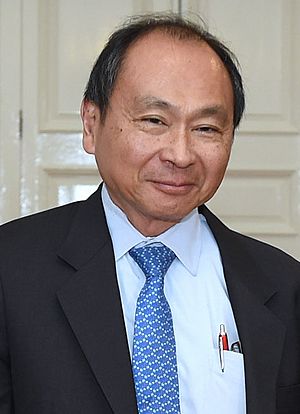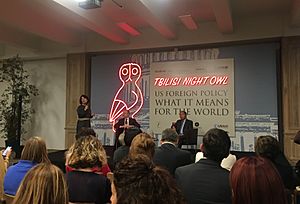Francis Fukuyama facts for kids
Quick facts for kids
Francis Fukuyama
|
|
|---|---|

Fukuyama in 2015
|
|
| Born | October 27, 1952 |
| Education | Cornell University (BA) Harvard University (MA, PhD) |
| Spouse(s) | Laura Holmgren |
| Era | 20th-century philosophy |
| Region | Western philosophy |
| Institutions | |
| Thesis | Soviet Threats to Intervene in the Middle East, 1956–1973: A Study of Soviet Risk-Taking |
| Doctoral advisors | Samuel P. Huntington |
|
Main interests
|
|
|
Notable ideas
|
End of history |
|
Influences
|
|
Francis Yoshihiro Fukuyama (born October 27, 1952) is an American political scientist and writer. He is famous for his book The End of History and the Last Man (1992). In this book, he suggested that the spread of liberal democracies (countries where people vote for their leaders and have many freedoms) and free-market capitalism (an economic system with private businesses) might be the final stage of human society and government. This idea has been discussed a lot.
Fukuyama is currently a senior expert at Stanford University. He works at the Center on Democracy, Development and the Rule of Law. He also directs the Ford Dorsey Master's in International Policy program at Stanford. Before this, he taught at Johns Hopkins University and George Mason University. He is also a member of the RAND Corporation, a group that studies global policy.
Contents
Early Life and Learning
Francis Fukuyama was born in Chicago, Illinois, in the United States. His family has Japanese roots. His grandfather moved from Japan in 1905. His father, Yoshio Fukuyama, was a minister and a sociologist. His mother, Toshiko Kawata Fukuyama, was from Kyoto, Japan. Her father helped start the Economics Department at Kyoto University.
Francis grew up in New York City. He was an only child and didn't learn Japanese. His family moved to Pennsylvania in 1967.
He went to Cornell University and studied classics, which is about ancient Greek and Roman culture. He then went to Harvard University for political science. He earned his Ph.D. there. His studies focused on how the Soviet Union might get involved in the Middle East. In 1979, he joined the RAND Corporation.
His Main Ideas
The End of History
Fukuyama is best known for his book The End of History and the Last Man. In this book, he wrote that after the Cold War ended and the Berlin Wall fell in 1989, the world was moving towards liberal democracy as the main way to govern. He believed that the big struggles between different political ideas were largely over.
He wrote in an article: "What we may be seeing is not just the end of the Cold War... but the end of history itself: that is, the end point of mankind's ideological evolution and the spread of Western liberal democracy as the final form of human government."
Some people thought this idea was too simple. However, Fukuyama remained an important public thinker. He also discussed how postmodern philosophy (a way of thinking that questions big ideas) might make liberal democracy weaker. He felt that hope for the future was important for society.
What Makes a Country Stable
In his 2011 book, The Origins of Political Order, Fukuyama explored what makes a country's government strong and lasting. He looked at history to understand this. He said that a good government needs to be modern and effective. It also needs to follow the rule of law (meaning laws apply to everyone, even leaders) and be accountable to its people.
His 2014 book, Political Order and Political Decay: From the Industrial Revolution to the Present Day, continued these ideas. He looked at how governments have changed since the French Revolution. He suggested that even strong countries like the U.S. can face "political decay." This means that government systems can become less effective over time.
Other Books and Ideas
Fukuyama has written many other books. In Trust: The Social Virtues and the Creation of Prosperity, he talked about how trust in society helps countries become wealthy.
In Our Posthuman Future: Consequences of the Biotechnology Revolution, he discussed how new technologies might change human nature. He worried that if humans could change themselves too much, it might affect liberal democracy and lead to big differences between people. He is against transhumanism, which is the idea that humans should try to become "posthuman" through technology.
His book The Great Disruption: Human Nature and the Reconstruction of Social Order looked at how social rules change when society moves from making things to an Information Age. He believed that humans naturally need social rules, so society would eventually fix itself.
In America at the Crossroads (2006), he discussed the history of neoconservatism, a political idea. He explained why he supported the Bush administration at first and where he thought it went wrong.
In 2018, his book Identity: The Demand for Dignity and the Politics of Resentment explored how people's need for respect and feelings of unfairness shape politics.
His 2022 book, Liberalism and Its Discontents, defended liberalism (a political idea focused on individual rights and freedoms) from its critics. He also criticized neoliberalism (a focus on free markets) and identity politics (politics based on group identities).
His Political Views
Early Views and Changes
Francis Fukuyama was involved in the rise of neoconservatism, a political movement. He was part of the Project for the New American Century, a think tank. He supported the idea of removing Saddam Hussein from power in Iraq. He also supported the Iraq War at first. He argued that countries must look out for their own security.
However, by 2006, Fukuyama started to disagree with some of the Bush administration's policies. He felt they were too focused on military action and didn't work well with other countries. He said that American foreign policy needed a new approach. He believed that while human rights are important everywhere, the U.S. shouldn't rely only on its power to achieve these goals.
Current Views
Fukuyama began to distance himself from the neoconservative ideas of the Bush administration. He felt they used too much military force, especially in the Middle East. By 2004, he was against the Iraq War.
He believed the U.S. made mistakes by:
- Overstating the danger from extremist groups.
- Not seeing that other countries would react negatively to its actions.
- Misjudging what was needed to bring peace to Iraq.
Fukuyama thinks the U.S. should promote its values by setting a good example and helping other countries develop. He believes that real change comes from within a country, not from outsiders. He also thinks the U.S. should work more with international groups, as it did after World War II. This idea is central to his 2006 book, America at the Crossroads.
In 2006, he wrote that neoconservatism had become something he could no longer support. He said that fighting terrorism should be more about winning "hearts and minds" than just military campaigns.
He supported Barack Obama in the 2008 United States presidential election. He felt that the Republican Party should be held responsible for the problems during the Bush presidency.
In 2018, when asked about socialist politics, he said that if "socialism" means programs that help share wealth more fairly, then it "ought to come back." He felt that the period of unregulated markets had caused problems.
In 2020, Fukuyama became the chair of the editorial board for American Purpose, a magazine that promotes liberal democracy and discusses challenges to it. He saw Joe Biden's victory in the 2020 United States presidential election as a sign that the Western system can fix its mistakes.
Views on the Russian Invasion of Ukraine
After Russia invaded Ukraine in February 2022, Fukuyama shared his thoughts in American Purpose:
- He predicted that Russia would lose because its plans were poor.
- He believed Russia's military position could collapse quickly.
- He thought a Russian defeat was necessary for any peace talks.
- He also felt that Vladimir Putin's rule in Russia would not last if his military failed.
- Fukuyama believed the war hurt the image of populist leaders who had supported Putin.
- He saw the war as a lesson for China, suggesting its military might also struggle in a real conflict. He hoped Taiwan would prepare for defense.
- He predicted that Turkish drones would become very popular.
- He felt that a Russian defeat would bring a "new birth of freedom" and help global democracy.
Fukuyama also stressed that national identity is important for defending liberal values. He believes that while human rights are universal, countries still need to be strong to protect them.
In a 2022 interview, Fukuyama supported social democratic policies. He said that countries like Germany and Scandinavia, which have social democratic governments, have healthier politics. He believes that the U.S. needs more social democracy now.
Other Connections
- From 2006 to 2008, Fukuyama advised Muammar Gaddafi through a consulting firm.
- In 2005, he helped start The American Interest, a magazine about America's role in the world. He later resigned due to disagreements.
- He has been a member of the RAND Corporation's Political Science Department and is now on its board.
- He was part of the President's Council on Bioethics from 2001 to 2004.
- He is a member of the World Academy of Art and Science.
- He is on the board of Global Financial Integrity.
- He is a member of the Inter-American Dialogue.
- He is on the International Advisory Board for Bellingcat, an investigative journalism group.
Personal Life
Fukuyama enjoys photography and building his own computers. He also has a hobby of reproducing early American furniture by hand. He is interested in sound recording and reproduction.
He is married to Laura Holmgren. They met when she was a graduate student and he worked for the RAND Corporation. They live in California and have three children: Julia, David, and John. He is also the first cousin of crime novelist Joe Ide.
See also
 In Spanish: Francis Fukuyama para niños
In Spanish: Francis Fukuyama para niños
- Biopolitics
- High trust and low trust societies
- Brave New World argument
- Obama Republicans (disambiguation)
- Vetocracy
 | Bayard Rustin |
 | Jeannette Carter |
 | Jeremiah A. Brown |


